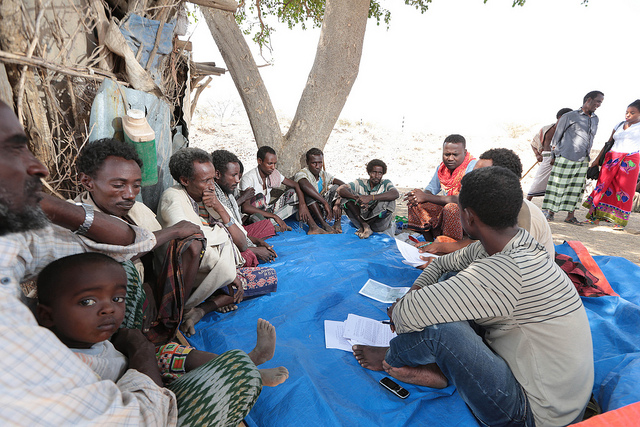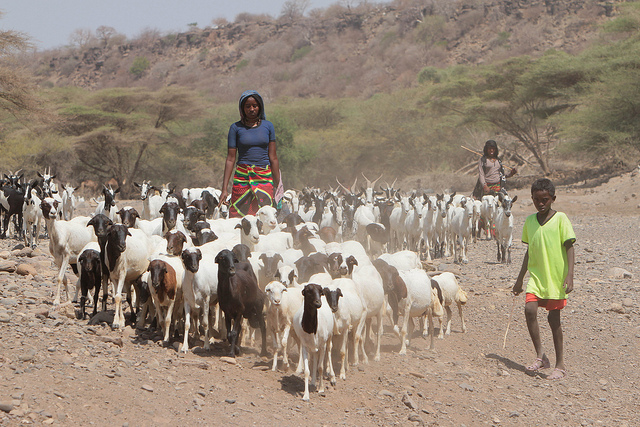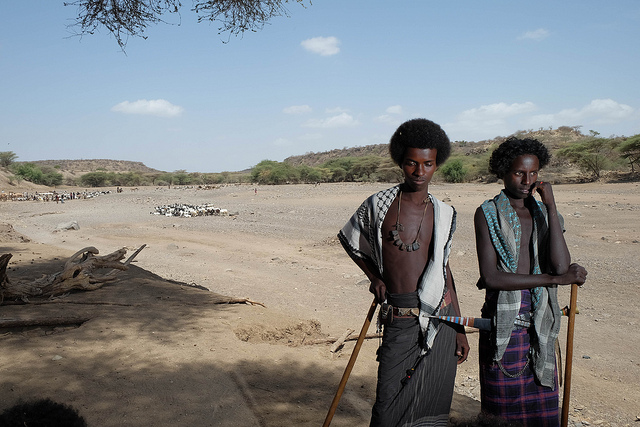By Zemen Haddis, PhD, Senior Agricultural Policy Advisor, USAID/Ethiopia
After five years of hard work, Borena pastoralists received the first ever communal land holding titles in the history of Ethiopia. In total, three communities covering over 40,000 households (over 255,000 people) now have the title to collectively use 2.7 million hectares of land – an area larger than the country of Rwanda.
Disputes over land access and grazing rights have long been a source of conflict between farmers and herders in Ethiopia. Since 2013, USAID has worked with pastoral herding communities to certify their rights to rangelands, building on previous efforts that certified farmers’ land use rights. The clarification and documentation of land rights for both farmers and herders is helping reduce tensions and create incentives for investments and economic growth.
On July 7, HE Dr. Kaba Urgessa, Ethiopian State Minister of the Federal Ministry of Agriculture and Livestock Resources, and Dr. Stephen Morin, Acting Deputy Mission Director of USAID Ethiopia handed the certificates over to community leaders in the town of Yabello in the Borena Zone. “We are proud to support the strengthening of land administration systems in general and communal land management in particular. I would like to congratulate and thank Borena communities and officials, as well as the Oromia Regional Government, and the Federal Ministry of Agriculture and Livestock Resources for their partnership in making this historic event possible,” said Dr. Morin.
Land Rights and the Journey to Self-Reliance
The demarcation and certification of grazing land helps pastoralists manage their land with a greater sense of ownership, strengthening their incentives to make investments and manage resources sustainably over the long-term. These reforms are an important step in Ethiopia’s journey to self reliance – improving governance at the local level by providing communities with decision-making rights over their most valuable natural assets: land, water, and other natural resources.
The certificates officially recognize traditional community landholdings that embrace dry and wet season grazing areas, livestock movement corridors, water points, and other natural resources. They also empower customary institutions, through the development of written bylaws to govern land management and ensure that all members of the community benefit from the strengthened tenure security. The bylaws recognize neighboring communities’ access to grazing areas, water points and travel corridors per traditional customs – an important step in mitigating tensions over land access and use.
The successful recognition of community land rights was the product of the collaborative efforts of USAID, the Government of Ethiopia, and local communities. Communal land certification is an entirely new process for the country. Rigorous studies were conducted and discussions and negotiations between government officials and communities were held to collect inputs in order to make evidence-based decisions. USAID’s communal land certification pilot projects in the Oromia and Afar regions helped to test, refine and expand methods for land certification to the wider pastoral communities. USAID has encouraged Ethiopian government officials to expand the best practices derived from these pilots to all pastoral and agro-pastoral areas in the country.
Laying the Groundwork
The issue of land tenure and property rights is a cornerstone for the success of Ethiopia’s growth and transformation plan. It is linked to peace and governance, agricultural and livestock productivity, food security, and conservation of natural resources. It also plays a key role in economic growth opportunities and prosperity for communities like Borena. As such, USAID has been partnering with the Government of Ethiopia on land tenure and property issues for years to lay the groundwork for this historic achievement.

Starting in 2013, USAID’s Land Administration to Nurture Development (LAND) project introduced innovative land policy and land administration activities, including supporting communal land demarcation and certification. Embarking on such a new and complex task was not easy but USAID was encouraged by the needs of pastoralists and the commitment of government officials to address various challenges and undertake collaborative solutions.
Simultaneously, USAID’s Pastoralists Resilience Improvement and Market Expansion (PRIME) project and its earlier iterations supported Borena pastoralists to strengthen natural resource management and improve feed and water availability for their livestock through strengthened roles of customary institutions. There were also efforts made to map natural resources, including wet and dry grazing areas, and develop participatory management plan. The LAND and PRIME projects worked together through a coordinated approach to achieve sustainable land management.
Rights and Responsibilities
Communal land administration issues still present challenges in many parts of Ethiopia and Africa. The Borena communal land demarcation will serve as a model to showcase the possibilities of improving tenure security by introducing community-managed land administration systems. With strengthened implementation of a communal land governance system, Borena will be a place where representatives from other Ethiopian communities and even other countries from around the globe will visit to learn best practices.
It is a new day for Borena pastoralists, marking a new chapter that will allow them to exercise greater control over their land and resources. Leaders of Borena communities are now shouldering an additional responsibility to demonstrate effective and accountable land administration services to all community members. We believe that the newly reorganized land governance entities will serve all members of the community fairly, regardless of their gender, age, or ethnicity. Through greater accountability and community participation, the new communal land governance system should embrace and ensure that the poor and other disadvantaged groups and individuals will benefit.



